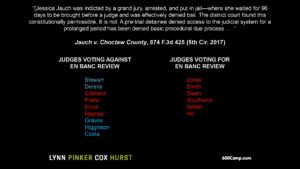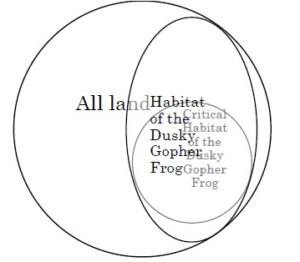 Making a not-so-subtle remark about the requirements for a successful en banc petition, the Fifth Circuit has amended local rule 35.5 to say: “35.5 Length. See Fed. R. App. P. 35(b)(2). The statement required by Fed. R. App. P. 35(b)(1) is included in the limit and is not a “certificate[ ] of counsel” that is excluded by Fed. R. App P. 32(f).” In other words, the certificate of counsel about the specific cases inconsistent with the panel opinion counts against the length limit.
Making a not-so-subtle remark about the requirements for a successful en banc petition, the Fifth Circuit has amended local rule 35.5 to say: “35.5 Length. See Fed. R. App. P. 35(b)(2). The statement required by Fed. R. App. P. 35(b)(1) is included in the limit and is not a “certificate[ ] of counsel” that is excluded by Fed. R. App P. 32(f).” In other words, the certificate of counsel about the specific cases inconsistent with the panel opinion counts against the length limit.
Category Archives: General Court Information
The Fifth Circuit recently denied en banc rehearing in the high-profile qualified immunity case of Jauch v. Choctaw County, where the panel denied immunity to a sheriff who had been sued over a lengthy period of pretrial detention. From one perspective, a chart of the 9-6 vote (below) shows a vote along “party lines,” with all of the votes for rehearing coming from judges appointed by Republican presidents (including both of President Trump’s recent appointments), and with all active judges appointed by Democratic presidents voting against rehearing. From another perspective, the vote shows that the group of active judges appointed by Republican presidents is hardly a monolithic bloc, as it divided roughly in half on the vote.
Celebrate with a true New Orleans muffuletta.
 A unanimous en banc opinion simplified the Fifth Circuit’s test for “whether a contract for performance of specialty services to facilitate the drilling or production of oil or gas on navigable waters is maritime.” The Court now asks: “First, is the contract one to provide services to facilitate the drilling or production of oil and gas on navigable waters? . . . Second, if the answer to the above question is ‘yes,’ does the contract provide or do the parties expect that a vessel will play a substantial role in the completion of the contract?” Larry Doiron, Inc. v. Jackson , No. 16-30217 (revised Jan. 11, 2018).
A unanimous en banc opinion simplified the Fifth Circuit’s test for “whether a contract for performance of specialty services to facilitate the drilling or production of oil or gas on navigable waters is maritime.” The Court now asks: “First, is the contract one to provide services to facilitate the drilling or production of oil and gas on navigable waters? . . . Second, if the answer to the above question is ‘yes,’ does the contract provide or do the parties expect that a vessel will play a substantial role in the completion of the contract?” Larry Doiron, Inc. v. Jackson , No. 16-30217 (revised Jan. 11, 2018).
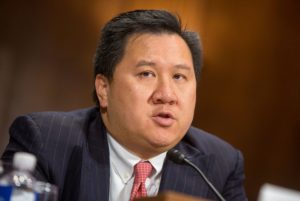 The Senate has now also confirmed Jim Ho to the Fifth Circuit.
The Senate has now also confirmed Jim Ho to the Fifth Circuit.
The Senate has confirmed Justice Don Willett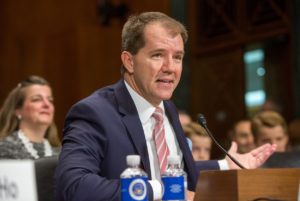 ‘s nomination to the Fifth Circuit.
‘s nomination to the Fifth Circuit.
Melton v. Phillips, No. 15-10604 (Nov. 13, 2017), a difficult qualified immunity case that required en banc review to resolve, features a concurrence with the unusual verb “cross-pollinated” to describe a confluence of two lines of authority. That perspective on the development of common law recalls the concept of “vegetation” in early scientific thought, used to describe vigorous and lively growth not just in plant life, but throughout nature. Indeed, no less than Isaac Newton wrote a paper about “Chymystry” titled “On Nature’s Obvious Laws and Processes in Vegetation”:
 Yes, according to Alexander v. Verizon Wireless Services LLC:
Yes, according to Alexander v. Verizon Wireless Services LLC:
Although many style guides, such as the Chicago Manual of Style, and news sources, such as the Associated Press, no longer instruct writers to capitalize “Internet,” we decline to follow this trend. For many, such as the New York Times, the reason for the change to “internet” is simple: others were doing it, so they thought they should, too. “Internet,” however, was originally capitalized to distinguish the global network from other internets—short for “inter networks”—which are collections of smaller networks that communicate using the same protocols. In our view, this still makes the word a proper noun, regardless of how often people refer to other internets. Furthermore, to the extent “decapitalizing [I]nternet is part of a universal linguistic tendency to reduce the amount of effort required to produce and process commonly-used words,” we reject the tasks of striking an additional key or reading over a capital “I” as persuasive reasons to alter a word.
No. 16-31227 n.12 (Nov. 13, 2017) (citations omitted).
 A rare Robert Heinlein citation appeared this week in United States v. Gibson: “The trouble with conspiracies is that they rot internally.” The Moon is a Harsh Mistress 76 (1966).
A rare Robert Heinlein citation appeared this week in United States v. Gibson: “The trouble with conspiracies is that they rot internally.” The Moon is a Harsh Mistress 76 (1966).
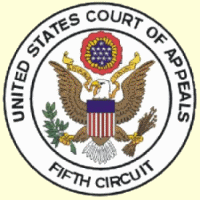 The Fifth Circuit describes its newly-created Pro Bono Program as follows. Great opportunity for quality appellate experience!
The Fifth Circuit describes its newly-created Pro Bono Program as follows. Great opportunity for quality appellate experience!
“The Program assists the Court by facilitating the appointment of pro bono counsel to represent pro se litigants. Pro Bono Panel members will, at the Court’s invitation, be appointed in civil appeals that, for example, present issues of first impression, complex facts or legal questions, or potentially meritorious claims warranting further briefing and/or oral argument.
Pro bono appointments are made by the Court, and are limited to proceedings before this Court. Although oral argument is not guaranteed, cases selected for the Program are likely to meet the Court’s criteria for granting oral argument.
Attorneys wishing to join the Pro Bono Panel should submit to the CMJS Office a cover letter (including statement of types of cases, if any, that counsel prefers or does not prefer), resumé, writing sample (appellate brief or brief of substantive motion), and statement of good standing in the Fifth Circuit Bar. Applications for panel membership should be emailed to the CMJS Office at probono@ca5.uscourts.gov. Questions about the program may be directed to Kate Clark, Administrative Attorney, at that email address or by telephone at 504-310-7799.”
 Thanks to Mary Douglass and the Bar Association of the Fifth Federal Circuit for the chance to give a commercial litigation update at the 2017 Appellate Advocacy Seminar in New Orleans; here is the PowerPoint that I used for the presentation yesterday.
Thanks to Mary Douglass and the Bar Association of the Fifth Federal Circuit for the chance to give a commercial litigation update at the 2017 Appellate Advocacy Seminar in New Orleans; here is the PowerPoint that I used for the presentation yesterday.
 Former Texas Solicitor General Jim Ho and Texas Supreme Court Justice Don Willett have been nominated to the U.S. Court of Appeals for the Fifth Circuit. The Texas Lawbook features a thorough discussion of the nominations, as does the Dallas Morning News. From Louisiana, President Trump has also nominated Stuart Duncan and U.S. District Judge Kurt Engelhardt; The Advocate has a good summary of their backgrounds.
Former Texas Solicitor General Jim Ho and Texas Supreme Court Justice Don Willett have been nominated to the U.S. Court of Appeals for the Fifth Circuit. The Texas Lawbook features a thorough discussion of the nominations, as does the Dallas Morning News. From Louisiana, President Trump has also nominated Stuart Duncan and U.S. District Judge Kurt Engelhardt; The Advocate has a good summary of their backgrounds.
 The four-part venue test adopted by the Eastern District of Texas after the Heartland opinion was short-lived, as the Federal Circuit granted mandamus relief in In re Cray, noting: “[O]ur analysis of the case law and statute reveal three general requirements relevant to the inquiry: (1) there must be a physical place in the district; (2) it must be a regular and established place of business; and (3) it must be the place of the defendant.”
The four-part venue test adopted by the Eastern District of Texas after the Heartland opinion was short-lived, as the Federal Circuit granted mandamus relief in In re Cray, noting: “[O]ur analysis of the case law and statute reveal three general requirements relevant to the inquiry: (1) there must be a physical place in the district; (2) it must be a regular and established place of business; and (3) it must be the place of the defendant.”
After last week’s opinion in In re: DuPuy Orthopaedics, the plaintiffs have sought en banc review of a panel majority’s statements about the trial court’s ruling on the key issue of waiver. The petition raises interesting and basic questions about the scope of opinions. (For more on that general topic, check out David Coale & Wendy Couture, Loud Rules, 34 Pepperdine L. Rev. 715 (2007)).
last week’s opinion in In re: DuPuy Orthopaedics, the plaintiffs have sought en banc review of a panel majority’s statements about the trial court’s ruling on the key issue of waiver. The petition raises interesting and basic questions about the scope of opinions. (For more on that general topic, check out David Coale & Wendy Couture, Loud Rules, 34 Pepperdine L. Rev. 715 (2007)).
 I am speaking at the Texas State Bar’s “Civil Appellate Practice 101” course on September 6 in Austin about key differences in procedural issues between Texas courts and federal courts in the Fifth Circuit. Here is a copy of the PowerPoint that I am using.
I am speaking at the Texas State Bar’s “Civil Appellate Practice 101” course on September 6 in Austin about key differences in procedural issues between Texas courts and federal courts in the Fifth Circuit. Here is a copy of the PowerPoint that I am using.
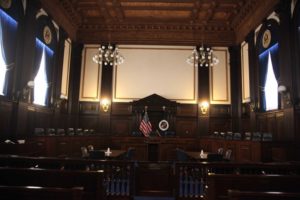 The Fifth Circuit recently granted rehearing en banc in two civil cases – Ariana M. v. Humana Health Services, 853 F.3d 753 (5th Cir. 2017), which reviewed the decisions of an ERISA plan administrator, and In re: Doiron, 849 F.3d 602 (5th Cir. 2017), which addressed whether a contract was “maritime” in nature. The common thread? Both opinions made express appeals to the full court for review:
The Fifth Circuit recently granted rehearing en banc in two civil cases – Ariana M. v. Humana Health Services, 853 F.3d 753 (5th Cir. 2017), which reviewed the decisions of an ERISA plan administrator, and In re: Doiron, 849 F.3d 602 (5th Cir. 2017), which addressed whether a contract was “maritime” in nature. The common thread? Both opinions made express appeals to the full court for review:
- In Ariana, all three panel members who joined in the same opinion also joined in a special concurrence: “As any sports fan dismayed that instant replay did not overturn a blown call learns, it is difficult to overcome a deferential standard of review. The deferential standard of review our court applies to ERISA decisions often determines the outcome of disputes that are far more important than a sporting event: decisions made by retirement and health plans during some of life’s most difficult times, as this case involving a teenager with a serious eating disorder demonstrates. So it is striking that we are the only circuit that would apply that deference to factual determinations made by an ERISA administrator when the plan does not vest them with that discretion.” (emphasis added)
- And the conclusion of the unanimous Dorian panel opinion said: “It is time to abandon the Davis & Sons test for determining whether or not a contract is a maritime contract. The test relies more on tort principles than contract principles to decide a contract case. It is too flexible to allow parties or their attorneys to predict whether a court will decide if a contract is maritime or non-maritime or for judges to decide the cases consistently. The Supreme Court’s decision in Kirby reinforces this conclusion. Just as important, the above test will allow all parties to the contract to more accurately allocate risks and determine their insurance needs more reliably.” (emphasis added)
I spoke a few days ago about recent Fifth Circuit opinions at the University of Texas Conference on State & Federal Appeals; here is a copy of the PowerPoint that I used.
I am speaking on the topic “Ethics 2017: Recent Federal Court Decisions to Know” on Friday, May 5, to the Plano Bar Association (noon at Palio’s Pizza, yum) – here is the PowerPoint that I will be using.
 In a break from the usual topics about federal procedure, today’s post about the case of Foster v. Woods provides some practical advice for private investigators. Foster, a licensed private investigator, tailed a car into a school parking lot and observed it for a short period before realizing that the driver was his target’s teenaged son. Unfortunately for Foster, the son observed him and told a friend, whose father was the local sheriff. After Foster left the school grounds the sheriff arrested him and unsuccessfully attempted to prosecute him for having brought a firearm onto school grounds (although Foster held a concealed-carry permit, and neither he nor the firearm left the car while in the school parking lot. Foster sued for wrongful arrest; the Fifth Circuit affirmed summary judgment for the sheriff: “Relevant here, Woods knew that Foster was not a student, that he followed a student’s vehicle into a student parking lot posted with a ‘no trespassing” sign, and that Foster remained in the lot for some time as students were arriving for school. . . . Given the facts known to Woods, he had knowledge that would warrant a reasonable officer to believe that Foster violated the trespass statute.” Advice – use caution when entering private property.
In a break from the usual topics about federal procedure, today’s post about the case of Foster v. Woods provides some practical advice for private investigators. Foster, a licensed private investigator, tailed a car into a school parking lot and observed it for a short period before realizing that the driver was his target’s teenaged son. Unfortunately for Foster, the son observed him and told a friend, whose father was the local sheriff. After Foster left the school grounds the sheriff arrested him and unsuccessfully attempted to prosecute him for having brought a firearm onto school grounds (although Foster held a concealed-carry permit, and neither he nor the firearm left the car while in the school parking lot. Foster sued for wrongful arrest; the Fifth Circuit affirmed summary judgment for the sheriff: “Relevant here, Woods knew that Foster was not a student, that he followed a student’s vehicle into a student parking lot posted with a ‘no trespassing” sign, and that Foster remained in the lot for some time as students were arriving for school. . . . Given the facts known to Woods, he had knowledge that would warrant a reasonable officer to believe that Foster violated the trespass statute.” Advice – use caution when entering private property.
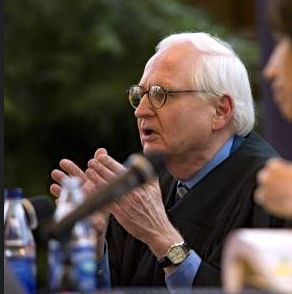 The Clarion-Ledger reports that Judge E. Grady Jolly of Mississippi will retire on his 80th birthday in October 2017, creating another vacancy on the Fifth Circuit for President Trump to fill. The same paper has a good description of the process for filling the vacancy. Judge Jolly has served the Fifth Circuit with distinction for 35 years; his skill and grace will be greatly missed.
The Clarion-Ledger reports that Judge E. Grady Jolly of Mississippi will retire on his 80th birthday in October 2017, creating another vacancy on the Fifth Circuit for President Trump to fill. The same paper has a good description of the process for filling the vacancy. Judge Jolly has served the Fifth Circuit with distinction for 35 years; his skill and grace will be greatly missed.
 In an interesting parallel to the ongoing litigation about travel bans (which most recently produced a District of Hawaii opinion granting a TRO), the Fifth Circuit denied en banc review in Defense Distributed v. U.S. Dep’t of State, which affirmed a preliminary injunction about the use of 3-D printing technology to make certain firearms. A dissent observes: “Certainly there is a strong public interest in national security. But there is a paramount public interest in the exercise of constitutional rights, particularly those guaranteed by the First Amendment . . . ” No. 15-50759 (March 15, 2017).
In an interesting parallel to the ongoing litigation about travel bans (which most recently produced a District of Hawaii opinion granting a TRO), the Fifth Circuit denied en banc review in Defense Distributed v. U.S. Dep’t of State, which affirmed a preliminary injunction about the use of 3-D printing technology to make certain firearms. A dissent observes: “Certainly there is a strong public interest in national security. But there is a paramount public interest in the exercise of constitutional rights, particularly those guaranteed by the First Amendment . . . ” No. 15-50759 (March 15, 2017).
 It is well-settled nationally that “an appellate court may not alter a judgment to benefit a nonappealing party” because “it takes a cross-appeal to justify a remedy in favor of an appellee.” Greenlaw v. United States, 554 U.S. 237, 244–45 (2008). The Fifth Circuit treats that principle as jurisdictional. See, e.g., Amazing Spaces, Inc. v. Metro Mini Storage, 608 F.3d 225, 250 (5th Cir. 2010) (“[T]his circuit follows the general rule that, in the absence of a cross-appeal, an appellate court has no jurisdiction to modify a judgment so as to enlarge the rights of the appellee or diminish the rights of the appellant.”) Some other Circuits, however, take a different view. See, e.g., Am. Roll-On Roll-Off Carrier LLC v. P&O Parts Baltimore, Inc., 479 F.3d 288, 295 (4th Cir. 2007) (“This circuit views the cross-appeal requirement as one of practice, rather than as a strict jurisdictional requirement.”) (Thanks to my LPCH colleague Russ Herman for pointing this out.)
It is well-settled nationally that “an appellate court may not alter a judgment to benefit a nonappealing party” because “it takes a cross-appeal to justify a remedy in favor of an appellee.” Greenlaw v. United States, 554 U.S. 237, 244–45 (2008). The Fifth Circuit treats that principle as jurisdictional. See, e.g., Amazing Spaces, Inc. v. Metro Mini Storage, 608 F.3d 225, 250 (5th Cir. 2010) (“[T]his circuit follows the general rule that, in the absence of a cross-appeal, an appellate court has no jurisdiction to modify a judgment so as to enlarge the rights of the appellee or diminish the rights of the appellant.”) Some other Circuits, however, take a different view. See, e.g., Am. Roll-On Roll-Off Carrier LLC v. P&O Parts Baltimore, Inc., 479 F.3d 288, 295 (4th Cir. 2007) (“This circuit views the cross-appeal requirement as one of practice, rather than as a strict jurisdictional requirement.”) (Thanks to my LPCH colleague Russ Herman for pointing this out.)
 Texas Lawyer reports that six candidates are under consideration for the two vacancies on the Fifth Circuit – “Texas Supreme Court Justice Don Willett; U.S. District Court Judge Reed O’Connor of Fort Worth; former Texas solicitor general James Ho; Andy Oldham, a deputy general counsel to Gov. Greg Abbott; Michael Massengale, a justice on Houston’s First Court of Appeals; and Brett Busby, a justice on Houston’s Fourteenth Court of Appeals” – the full story appears here.
Texas Lawyer reports that six candidates are under consideration for the two vacancies on the Fifth Circuit – “Texas Supreme Court Justice Don Willett; U.S. District Court Judge Reed O’Connor of Fort Worth; former Texas solicitor general James Ho; Andy Oldham, a deputy general counsel to Gov. Greg Abbott; Michael Massengale, a justice on Houston’s First Court of Appeals; and Brett Busby, a justice on Houston’s Fourteenth Court of Appeals” – the full story appears here.
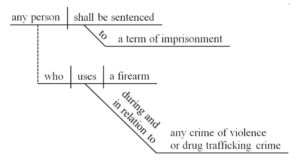 Press coverage of Judge Neil Gorsuch’s nomination to the Supreme Court has noted his intelligent and accessible writing style, including use of a sentence diagram (left) in a criminal case that turned on what elements of the crime
Press coverage of Judge Neil Gorsuch’s nomination to the Supreme Court has noted his intelligent and accessible writing style, including use of a sentence diagram (left) in a criminal case that turned on what elements of the crime  required proof of intent. In the same spirit, in dissent from the denial of en banc rehearing in a highly technical case about protection of the dusky gopher frog (right), Judge Edith Jones used a pair of Venn diagrams to illustrate her view of how the Endangered Species Act should operate (below left), contrasted with the panel opinion’s (below right). Markle Interests v. U.S. Fish & Wildlife Service, No. 14-31008 (Feb. 14, 2017).
required proof of intent. In the same spirit, in dissent from the denial of en banc rehearing in a highly technical case about protection of the dusky gopher frog (right), Judge Edith Jones used a pair of Venn diagrams to illustrate her view of how the Endangered Species Act should operate (below left), contrasted with the panel opinion’s (below right). Markle Interests v. U.S. Fish & Wildlife Service, No. 14-31008 (Feb. 14, 2017).
On Dallas’s Fox 4 News, following the lead of the Matrix movies, I characterize the nominee as “Scalia Reloaded”:
 The first ever Bench-Bar conference for the Northern District of Texas will be held on January 27 at the Four Seasons in Las Colinas. Here is the schedule and registration information; it looks to be a great program and the beginning of a strong tradition.
The first ever Bench-Bar conference for the Northern District of Texas will be held on January 27 at the Four Seasons in Las Colinas. Here is the schedule and registration information; it looks to be a great program and the beginning of a strong tradition.
On December 7, Judges Graves, Higginbotham, and Jolly heard oral argument in the high-profile False Claims Act case of Harman v. Trinity Industries. A recording of the full argument is available online, and the Texas Lawbook published a thorough summary shortly after the argument.
 The NLRB consistently holds that an agreement requiring arbitration of individual claims (and thus foreclosing class actions) violates federal labor law; the Fifth Circuit consistently reverses the NLRB on this point. After again reversing the NLRB and citing the Circuit’s “rule of orderliness” about deference to prior panel decisions, the Court noted the NLRB’s remarkably candid litigation position: “The Board concedes that this court has squarely rejected both of those decisions, and that our precedents necessitate rejecting its arguments here. The Board further acknowledges that it seeks to manufacture a circuit split in order to ‘facilitate Supreme Court review.'” Employers Resource v. NLRB, No. 16-60034 (Nov. 1, 2016, unpublished).
The NLRB consistently holds that an agreement requiring arbitration of individual claims (and thus foreclosing class actions) violates federal labor law; the Fifth Circuit consistently reverses the NLRB on this point. After again reversing the NLRB and citing the Circuit’s “rule of orderliness” about deference to prior panel decisions, the Court noted the NLRB’s remarkably candid litigation position: “The Board concedes that this court has squarely rejected both of those decisions, and that our precedents necessitate rejecting its arguments here. The Board further acknowledges that it seeks to manufacture a circuit split in order to ‘facilitate Supreme Court review.'” Employers Resource v. NLRB, No. 16-60034 (Nov. 1, 2016, unpublished).
 Bonnie Pereida’s estate successfully brought RICO claims against a dealer in rare coins, arguing that it systematically deceived Ms. Pereida about the quality of the coins she bought from it. The Fifth Circuit agreed with the estate that the RICO claim survived her, finding that “RICO’s remedial purpose predominates” over its penal purposes. But, it reversed as to the proof of a “pattern of racketeering activity,” finding that the relevant time period was too short and did not qualify as “open-ended.” It noted that on remand, the plaintiff could potentially still elect a remedy in common-law fraud where this problem would not arise.
Bonnie Pereida’s estate successfully brought RICO claims against a dealer in rare coins, arguing that it systematically deceived Ms. Pereida about the quality of the coins she bought from it. The Fifth Circuit agreed with the estate that the RICO claim survived her, finding that “RICO’s remedial purpose predominates” over its penal purposes. But, it reversed as to the proof of a “pattern of racketeering activity,” finding that the relevant time period was too short and did not qualify as “open-ended.” It noted that on remand, the plaintiff could potentially still elect a remedy in common-law fraud where this problem would not arise.
During that analysis, the Court offered a telling general comment: “[Plaintiff] contends that the Defendants waived this challenge to the ‘pattern’ element by raising it for the first time in their motion for a new trial. It should have been raised, he argues, in a motion for summary judgment so he would have known that this was a contested issue. The argument says a lot about modern civil litigation in which summary judgment, rather than trial, has become the focus. But when a case does go to trial, the burden is on the plaintiff to prove every element.” Malvino v. Dellniversita, No. 15-41435 (Oct. 20, 2016) (emphasis added).
Here is my PowerPoint from my “Fifth Circuit Update” presentation at the Advanced Civil Appellate Course in Austin. Note that it includes some initial notes on Globeranger-AG v. Software AG, a major intellectual property opinion released earlier this week.
 A recurring theme in my CLE presentations about the Fifth Circuit is that the phrase “a conservative court” is largely meaningless. To be sure, a majority of Fifth Circuit judges were appointed by Republican presidents, and many judges on the court have “conservative” philosophies, but what that actually means in a specific case about separation of power between judge and jury, trial and appellate courts, branches of government, etc. can vary a great deal.
A recurring theme in my CLE presentations about the Fifth Circuit is that the phrase “a conservative court” is largely meaningless. To be sure, a majority of Fifth Circuit judges were appointed by Republican presidents, and many judges on the court have “conservative” philosophies, but what that actually means in a specific case about separation of power between judge and jury, trial and appellate courts, branches of government, etc. can vary a great deal.
Consider the recent 8-7 vote against en banc rehearing in Passmore v. Baylor Health, discussed in yesterday’s post, which involved a close Erie question about state law pre-suit requirements. In a slide I just prepared for the upcoming Advanced Civil Appellate course in Austin, you can see the nominees of Republican presidents in red and those of Democratic presidents in blue — the “for” vote was 5-2 and the “against” vote was 5-3. (The judges with stars by their names joined a dissent.) Perhaps that split just shows that this technical issue is not ideological, but I think it also shows that there is far more to judicial philosophy than the simple label of “conservative.”
 The Fifth Circuit recently denied en banc review — by a “photo finish” 8-7 vote — of Passmore v. Baylor Health System, which concluded that Texas’s expert report requirements for medical malpractice cases were procedural and did not apply in federal court under the Erie doctrine. A dissent argued that this vote was inconsistent with the recent en banc opinion in Flagg v. Stryker Corp. that analyzed a comparable requirement of Louisiana law.
The Fifth Circuit recently denied en banc review — by a “photo finish” 8-7 vote — of Passmore v. Baylor Health System, which concluded that Texas’s expert report requirements for medical malpractice cases were procedural and did not apply in federal court under the Erie doctrine. A dissent argued that this vote was inconsistent with the recent en banc opinion in Flagg v. Stryker Corp. that analyzed a comparable requirement of Louisiana law.
 In a case about the scope of a “drilling rig” exclusion in an insurance policy, a party asked the Fifth Circuit to not follow a previous unpublished opinion because it was not binding precedent. The Court disagreed, stating: “While [Appellant] is correct, we find Cash’s reasoning compelling,” and then applying the precedents cited by the opinion. Nonbinding precedent has persuasive power. Richard v. Dolphin Drilling Ltd., No. 16-30003 (Aug. 1, 2016).
In a case about the scope of a “drilling rig” exclusion in an insurance policy, a party asked the Fifth Circuit to not follow a previous unpublished opinion because it was not binding precedent. The Court disagreed, stating: “While [Appellant] is correct, we find Cash’s reasoning compelling,” and then applying the precedents cited by the opinion. Nonbinding precedent has persuasive power. Richard v. Dolphin Drilling Ltd., No. 16-30003 (Aug. 1, 2016).
 By short per curiam orders resulting from 4-4 votes, the Supreme Court affirmed the Fifth Circuit’s opinion that upheld an injunction of major parts of President Obama’s immigration program, Texas v. United States, 809 F.3d 134 (5th Cir. 2015), and an important opinion about the jurisdiction of Indian tribal courts, Dolgencorp v. Mississippi Band of Choctaw Indians, 746 F.3d 167 (5th Cir. 2014).
By short per curiam orders resulting from 4-4 votes, the Supreme Court affirmed the Fifth Circuit’s opinion that upheld an injunction of major parts of President Obama’s immigration program, Texas v. United States, 809 F.3d 134 (5th Cir. 2015), and an important opinion about the jurisdiction of Indian tribal courts, Dolgencorp v. Mississippi Band of Choctaw Indians, 746 F.3d 167 (5th Cir. 2014).- These rulings are a “split decision” for Judge Jerry Smith, who wrote for the panel majority in Texas while dissenting in Dolgencorp.
- It is unfortunate that the political process has not produced a ninth Supreme Court Justice, so that the voice of the nation’s highest court could be heard on these important questions of public policy.
 In a 4-3 opinion written by Justice Kennedy, the Supreme Court affirmed the Fifth Circuit’s exhaustive analysis and validation of the admissions policies used by the University of Texas at Austin. Fisher v. University of Texas, No. 14–981 (U.S. June 23, 2016). The Dallas Morning News has an excellent summary of this case’s long history.
In a 4-3 opinion written by Justice Kennedy, the Supreme Court affirmed the Fifth Circuit’s exhaustive analysis and validation of the admissions policies used by the University of Texas at Austin. Fisher v. University of Texas, No. 14–981 (U.S. June 23, 2016). The Dallas Morning News has an excellent summary of this case’s long history.
I recently spoke at the University of Texas appellate course to provide an update on recent Fifth Circuit cases, here is my PowerPoint from that presentation.
 Alleging that a toe joint implant did not work properly, Flagg sued “Manufacturing Defendants” (who built the implant) and “Medical Defendants” (who surgically installed it in Flagg’s foot.) The Manufacturing Defendants were diverse from Flagg, a Louisiana citizen, while the Medical Defendants were not.
Alleging that a toe joint implant did not work properly, Flagg sued “Manufacturing Defendants” (who built the implant) and “Medical Defendants” (who surgically installed it in Flagg’s foot.) The Manufacturing Defendants were diverse from Flagg, a Louisiana citizen, while the Medical Defendants were not.
Affirming the district court while reversing the panel, an 11-4 en banc opinion holds “the plaintiff had improperly joined the non-diverse defendants because [he] has not exhausted his claims against those parties as required by statute.” That Louisiana statute requires review by a “medical review panel” before suit is filed against a health care provider; the Fifth Circuit concluded that pursuant to it, “there is no doubt that the state court would have been required to dismiss the Medical Defendants from the case,” as no such review had occurred at the time of removal. A vigorous dissent raised questions about the Court’s standard for analyzing claims of improper joinder, as well as whether this kind of state statute (“a non-adjudicative, non-comprehensive, waivable process since concluded in this case”) was a proper foundation for an improper joinder claim. Flagg v. Stryker Corp., No. 14-31169 (March 24, 2016) (en banc).
 The panel majority in Torres v. SGE Management, 805 F.3d 145 (5th Cir. 2015) decertified a class action about the operation of a multilevel marketing program. The full Court has now granted en banc review of this important decision about a significant area of the economy.
The panel majority in Torres v. SGE Management, 805 F.3d 145 (5th Cir. 2015) decertified a class action about the operation of a multilevel marketing program. The full Court has now granted en banc review of this important decision about a significant area of the economy.
 Justice Blackmun famously declared, “From this day forward, I no longer shall tinker with the machinery of death.” Callins v. Collins, 510 U.S. 1141 (1994). In less dramatic fashion, in the 9th appeal from a ruling about the administration of the Deepwater Horizon settlement, the Fifth Circuit has declared: “If the discretionary nature of the district court’s review is to have any meaning, the court must be able to avoid appeals like this one which involve no pressing question of how the [BP] Settlement Agreement should be interpreted or implemented, but simply raise the correctness of a discretionary administrative decision in the facts of a single claimant’s case.” In re Deepwater Horizon, No. 15-30395 (March 8, 2016).
Justice Blackmun famously declared, “From this day forward, I no longer shall tinker with the machinery of death.” Callins v. Collins, 510 U.S. 1141 (1994). In less dramatic fashion, in the 9th appeal from a ruling about the administration of the Deepwater Horizon settlement, the Fifth Circuit has declared: “If the discretionary nature of the district court’s review is to have any meaning, the court must be able to avoid appeals like this one which involve no pressing question of how the [BP] Settlement Agreement should be interpreted or implemented, but simply raise the correctness of a discretionary administrative decision in the facts of a single claimant’s case.” In re Deepwater Horizon, No. 15-30395 (March 8, 2016).
Principled and provocative, Justice Scalia served as the Supreme Court’s liaison to the Fifth Circuit for many years. Vaya con Dios.
In unsurprising but still important news, the Supreme Court has decided to review the Fifth Circuit’s opinion in Texas v. United States, the challenge to President Obama’s immigration initiatives. The order granting the petition notes: “In addition to the questions presented by the  petition, the parties are directed to brief and argue the following question: ‘Whether the Guidance violates the Take Care Clause of the Constitution, Art. II, §3.'”
petition, the parties are directed to brief and argue the following question: ‘Whether the Guidance violates the Take Care Clause of the Constitution, Art. II, §3.'”
Here is a reprint of my article this week in the Texas Lawbook, Federal Litigation in the Fifth Circuit in the New Year. I hope you find it informative and helpful.
 TransCanada has sued in Houston federal court about the Keystone Pipeline, alleging that President Obama exceeded his Constitutional authority by denying the necessary permission to proceed. While this just-filed lawsuit is a long way from Fifth Circuit review, and TransCanada has a substantial business presence in Houston, it comes as no surprise after the rejection of President Obama’s immigration policies in Texas v. United States that this challenge to executive power would be filed in this Circuit. Here is the complaint in TransCanada v. Kerry.
TransCanada has sued in Houston federal court about the Keystone Pipeline, alleging that President Obama exceeded his Constitutional authority by denying the necessary permission to proceed. While this just-filed lawsuit is a long way from Fifth Circuit review, and TransCanada has a substantial business presence in Houston, it comes as no surprise after the rejection of President Obama’s immigration policies in Texas v. United States that this challenge to executive power would be filed in this Circuit. Here is the complaint in TransCanada v. Kerry.
 In an opinion with enormous policy impact, the Fifth Circuit has affirmed the injunction of President Obama’s executive actions about immigration. Texas v. United States, No. 15-40238 (revised Nov. 25, 2015). Judge Smith wrote for the 2-judge majority, joined by Judge Elrod — an unsurprising outcome, since they formed the majority in the Court’s earlier opinion that denied an interim stay. Judge King dissented. A petition for Supreme Court review is a certainty. A good representative article about the decision appears in The Atlantic.
In an opinion with enormous policy impact, the Fifth Circuit has affirmed the injunction of President Obama’s executive actions about immigration. Texas v. United States, No. 15-40238 (revised Nov. 25, 2015). Judge Smith wrote for the 2-judge majority, joined by Judge Elrod — an unsurprising outcome, since they formed the majority in the Court’s earlier opinion that denied an interim stay. Judge King dissented. A petition for Supreme Court review is a certainty. A good representative article about the decision appears in The Atlantic.
Here is my PowerPoint for the “Fifth Circuit Update” that I presented at the State Bar’s Advanced Civil Appellate course last week in Austin. (Note that the Fifth Circuit has since issued a revised opinion in the Daubert case of Kovaly v. Wal-Mart, No. 14-20697 (Sept. 22, 2015, unpublished).
 1. As the Supreme Court term wound down, it affirmed the panel opinion in Baker Botts LLP v. ASARCO, holding that under the Bankruptcy Code: “Section §330(a)(1) does not permit bankruptcy courts to award fees to §327(a) professionals for defending fee applications.” No. 14–103 (U.S. June 15, 2015).
1. As the Supreme Court term wound down, it affirmed the panel opinion in Baker Botts LLP v. ASARCO, holding that under the Bankruptcy Code: “Section §330(a)(1) does not permit bankruptcy courts to award fees to §327(a) professionals for defending fee applications.” No. 14–103 (U.S. June 15, 2015).
2. The Supreme Court also granted review of Dolgencorp Inc. v. Mississippi Band of Choctaw Indians, 746 F.3d 167 (5th Cir. 2014), which addresses Indian tribal court jurisdiction over a tort claim.
Moving to dismiss? Drafting a complaint? Educating a colleague? Check out the newly-revised Twombly/Iqbal page on 600Camp, which includes the recent insights from Wooten v. McDonald Transit Associates, No. 13-11035 (June 7, 2015) (statutory employment claim), Owens v. Jastrow, No. 13-10928 (June 12, 2015) (scienter), and mortgage servicing cases.
At mid-year 2015, you can see here my recommendations for five cases from the last 3 months that are well worth a read.
 In three opinions — one for each state in the Fifth Circuit — the Court remanded the “gay marriage” cases in light of Obergefell v. Hodges. E.g., De Leon v. Abbott, No. 14-31037 (July 1, 2015). Noting that the Supreme Court addressed both the Fourteenth and First Amendments in its opinion, the Fifth Circuit observed: “We express no view on how controversies involving the intersection of these rights should be resolved but instead leave that to the robust operation of our system of laws and the good faith of those who are impacted by them.” (I was recently quoted by the Dallas Morning News about other matters related to Obergefell.)
In three opinions — one for each state in the Fifth Circuit — the Court remanded the “gay marriage” cases in light of Obergefell v. Hodges. E.g., De Leon v. Abbott, No. 14-31037 (July 1, 2015). Noting that the Supreme Court addressed both the Fourteenth and First Amendments in its opinion, the Fifth Circuit observed: “We express no view on how controversies involving the intersection of these rights should be resolved but instead leave that to the robust operation of our system of laws and the good faith of those who are impacted by them.” (I was recently quoted by the Dallas Morning News about other matters related to Obergefell.)
In Texas v. United States, the high-profile challenge to the Obama Administration’s immigration policies, the oral argument panel has been announced for the “merits” argument on July 10 — Judges King, Smith, and Elrod. Of course, Judges Smith and Elrod were the two majority votes on the “preliminary stay” panel that ruled for the plaintiffs and denied a stay, strongly signalling how they will the view the issues presented in this phase of the case.
